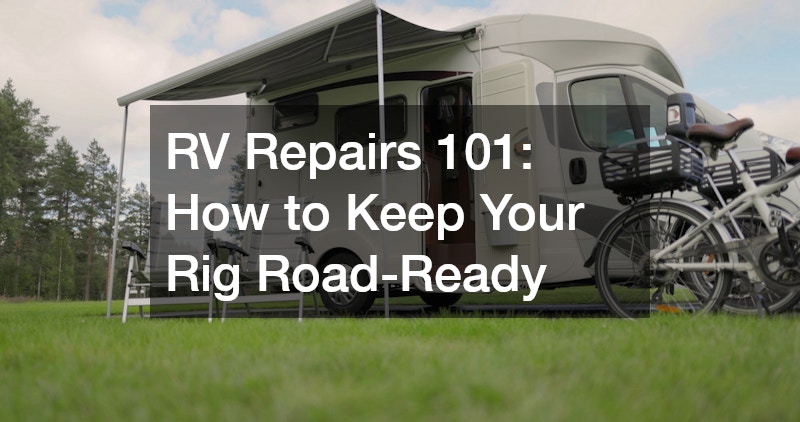Recreational vehicles are a great way to enjoy the freedom of the open road, offering both adventure and comfort. However, this freedom comes with the responsibility of regular maintenance to ensure that each journey is as safe as it is enjoyable. Proper maintenance and timely repairs are crucial not just for the longevity of the RV, but also for the safety of its occupants.
Understanding Electrical System Failures
Electrical system failures can range from minor inconveniences to major safety hazards. Common issues include blown fuses, faulty wiring, and drained batteries.
It’s essential to have a basic understanding of your RV’s electrical system to navigate these challenges efficiently.
Using a multimeter can be extremely helpful in diagnosing electrical problems, allowing you to check for continuity and proper voltage levels. This tool can assist you in determining whether the problem lies with the battery, wiring, or other components. Addressing these issues promptly can prevent them from escalating into more severe problems.
Always ensure that your RV’s electrical system is compatible with campgrounds’ power sources to avoid overloading circuits. Carry spare fuses and a basic toolkit to manage common electrical repairs when on the road. Regularly check the integrity of electrical connections and replace any worn or frayed cables promptly.
Dealing with Roof Leaks
Roof leaks are among the most common and damaging issues faced by RV owners. These leaks often result from weather exposure, wear, and tear over time. Spotting the early signs of leaks can save costly repairs and prevent extensive water damage to your RV’s interior.
It’s advisable to inspect the roof for cracks, worn seals, or gaps regularly, especially after heavy rain or snow. Apply a quality roof sealant at the first sign of potential leaks to prevent water from infiltrating and causing further damage. Implementing regular roof inspections into your maintenance routine can significantly extend the life of your RV.
Developing a Regular Maintenance Schedule
Setting up a regular maintenance schedule is vital for the overall health of your RV, much like routine check-ups are for humans. This schedule should encompass all essential components like electrical, plumbing, and mechanical systems. Staying consistent with your maintenance routine can prevent minor issues from escalating into severe problems.
Begin by consulting your RV’s owner’s manual, which often includes a comprehensive maintenance checklist. Keep track of any repairs done and parts replaced, as this history can be invaluable for future maintenance tasks. Make it a habit to inspect your RV before and after every road trip to catch any wear or issues early.
Factor in seasonal changes and adjust your maintenance schedule accordingly. For instance, more frequent checks may be necessary during seasons of heavy use or before winter storage. Scheduling regular professional inspections can also offer peace of mind and assure that nothing crucial has been overlooked.
Keeping Track of Maintenance Records
Maintaining detailed records of all RV repairs and maintenance activities performed on your RV is an often underestimated but vital task. Documentation provides a clear overview of what has been done and when, facilitating future repairs and potential resale. These records can also assist in scheduling future maintenance tasks more efficiently and in identifying repetitive issues.
Create a dedicated folder or digital file where you store invoices, manuals, and any notes on maintenance work. Easy access to this information allows you to communicate more effectively with repair professionals, should the need arise. It also helps in assessing the value and reliability of your RV if you decide to sell or trade it.
Stay organized by categorizing records under sections like electrical, plumbing, engine, and interior repairs. Make it a routine to update the records immediately after any maintenance is carried out. This simple habit can provide peace of mind, knowing that no past or upcoming task is overlooked.
When to Call in a Professional
Knowing when to call in a professional is critical to maintaining your RV’s integrity and safety. Complex repairs involving your RV’s engine, electrical, or gas systems should typically be handled by certified technicians. Entrusting these repairs to professionals can often save time and mitigate additional risks associated with DIY attempts.
Look for signs that indicate a professional is needed, such as leaking gas, persistent electrical faults, or recurring mechanical issues. A licensed technician has the expertise to perform accurate diagnostics and repairs, ensuring the job is done safely and correctly. Particularly for newer RV models under warranty, professional repairs might be a requirement to maintain coverage.
Consider establishing a rapport with a local RV repair shop or a technician who specializes in RV maintenance. They can provide valuable insights into recurring issues and have access to advanced diagnostic tools that might not be available to a DIY enthusiast. Having a go-to professional can enhance your RV ownership experience by providing peace of mind and expertise when needed.
Proactive maintenance is your best tool for ensuring that your RV remains in excellent condition for all your adventures. By understanding common issues, scheduling regular upkeep, and knowing when to seek professional help, you can enjoy worry-free travels. A well-maintained RV not only enhances your travel experience but also offers peace of mind on the road.
.

